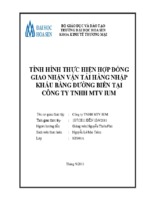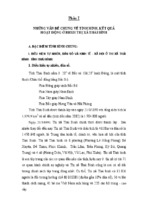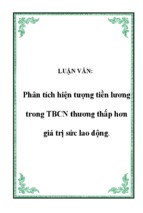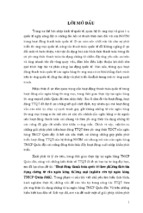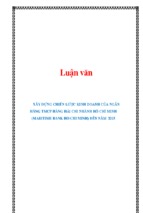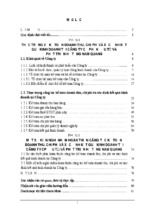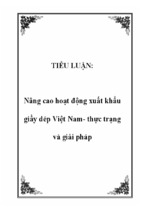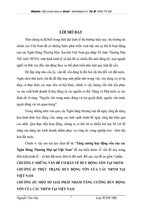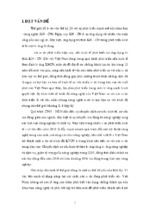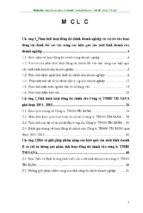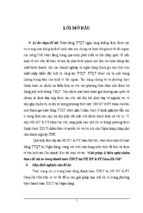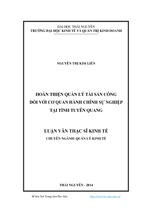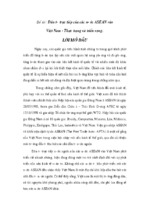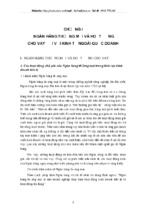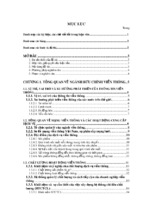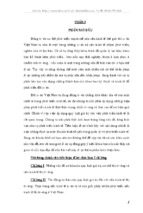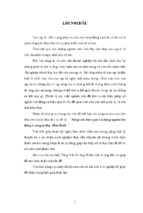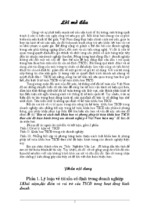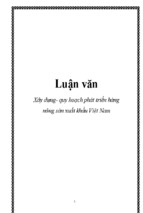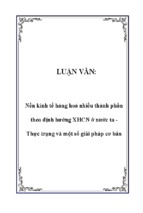MINISTRY OF EDUCATION AND TRAINING
HANOI NATIONAL UNIVERSITY OF EDUCATION
DINH THI PHUONG THU
PEOPLE'S CLOSENESS IDEOLOGY IN VIETNAMESE
MEDIEVAL LITERATURE
(FROM THE 10TH CENTURY TO THE 17TH
CENTURY)
Concentration: Vietnamese
Literature Code: 9.22.01.21
SUMMARY OF DISSERTATION FOR A DOCTORAL
DEGREE IN LITERATURE
(Concentration: Vietnamese Literature)
HANOI - 2020
The dissertation is completed at:
Faculty of Literature, Hanoi National University of Education
Supervisor:
Prof. Dr. La Nham Thin
Reviewer 1: Prof. Dr. Bien Minh Dien - Vinh Unieversity
Reviewer 2: Prof. Dr. Le Thoi Tan - Ha Noi Capital University
Reviewer 3: Prof. Dr. Duong Tuan Anh
- Hanoi National University of Education
The dissertation will be defended in front of the University-level
Dissertation Evaluation Committee at Hanoi National University of
Education, No. 136 Xuan Thuy, Cau Giay, Hanoi
At …….o’clock …….., date …… month……. year 2020.
The dissertation can be found at:
- National Library of Vietnam, Hanoi.
1
- Library of
Hanoi National
University of Education.
1. Rationale
1.1.
Scientific
rationale
INTRODUCTION
People-closeness ideology is a great thought in the
history of Vietnamese thought. Awareness of the role
and strength of the people towards the survival and
development of each nation and setting progressive
political and social policies towards the peoplecloseness is a a long process in the history of
Vietnamese thought. People-closeness
Vietnamese
medieval
literature
ideology in
has
its
own
characteristics compared to modern literature. Through
the development and ups and downs of feudal dynasties,
generations of Confucian intellectuals in the Middle
Ages have absorbed the influence of Confucian,
Buddhism, Taoism ideology, at the same time,
combined with the national spirit and the spirit of the
times to bring to literature rich colors of the peoplecloseness ideology. People- closeness ideology in
medieval literature from the tenth century to the end of
the seventeenth century reflects major problems in
the history of Vietnamese thought and Vietnamese
literature. Understanding the people-closeness ideology
contributes to understanding more deeply issues about
the author, works, the development rules of Vietnamese
medieval literature. With that in mind, the the
dissertation selected the topic
People-closeness ideology in Vietnamese medieval
th
literature from the 10 century to the
th
end of the 17 century.
1.2.
Practical rationale
Medieval literature was taught in large numbers in
schools from high schools to universities, especially
th
literary works from the 10
th
to the 17
centuries
regarding the issue of people-closeness ideology. The
topic, from the perspective of literature, contributes to
explain the problems posed in life. The people are both
2
historical subjects and
from the tenth century to the seventeenth century
the driving force of
with historical
social
development.
Therefore, any ruling
class
that
wants
to
maintain its stability
must stick with the
people must have an
appropriate policy of
nurturing
the
and
laity.
the
people
The
correct assessment of
the people's position
and
role
has
in
history
important
implications
for
the
survival of each social
form in history, is a
red thread throughout
the
process of national
construction and
development. With the
above reasons, the
topic is necessary,
current, scientific and
practical.
2. Research
purpose and tasks
2.1.
Research
purpose
The purpose of the
topic is to highlight
the
people-closeness
ideology in medieval
Vietnamese
literature
3
movement through stages with typical tendencies, authors and works. In particular, the
dissertation focuses on analyzing and explaining the roots of the people-closeness ideology,
the basic contents of the ideology, identifying the characteristics as well as the ability to
continue and develop in the movement of this ideology through stages. The peoplecloseness ideology in the Vietnamese medieval literature evokes the lessons of the ideology
in modern times.
2.2.
Research tasks
To achieve the research purpose, the dissertation focuses on the main research tasks:
- The concept of the people and the ideology of people-closeness. Criteria for determining
the ideology of people-closeness in literary works; - Study on the expressive contents of the
ideology in each literary period with typical tendencies, authors and works; - Evaluation of
the characteristics of the ideology of people-closeness in the Vietnamese medieval literature
during the period X - XVII, the development of people-closeness ideology in the historical
process; - Study on the artistic aspects expressing people-closeness ideology when
necessary.
3. Research subject and scope of survey materials
3.1.
Research subject
The research subject of the dissertation is to find out about the ideology of peoplecloseness in medieval Vietnamese literature according to literary stages with typical
tendencies, authors and works of medieval literature from the tenth century to the end of the
seventeenth century. In the first four centuries, survey focused mainly on the authors of the
Li - Tran dynasty. The ideology in the fifteenth century literature is expressed through the
compositions of the writers during the Lam Son uprising and Hong Duc period. The
ideology of people-closeness in the literature of the sixteenth century with the typical
examples is Nguyen Binh Khiem; Phung Khac Khoan; XVII century with the works Thien
Nam minh giam, Thien Nam ngu luc, ...
3.2.
Scope of survey materials
The author of the dissertation will focus on the compositions of authors expressing
the people-closeness ideology from the 10th century to the end of the 17th century. The
main sources that we use as a basis for use in the research process are: Li – Tran Poetry
[12,13,16]; General collection of Vietnamese literature [116,134]; Full collection of Nguyen
Trai [94]; Full collection of Nguyen Trai. New version [95,96,97]; Poems in Chinese
character by Le Thanh Tong [52]; Hong Duc quoc am thi tap [42]; Collection of poetry in
4
the Mac era [184]; Poetry of the Viet [45]; Nguyen Binh Khiem's Works (General
Collection) [164]; Phung Khac Khoan, Collection of works [129]; Thien Nam ngu luc Historical performance [117]; Thien Nam minh giam [47]. In addition to the literature, the
dissertation also surveyed folk literature.
4. Research Methods
The dissertation uses the following main research methods: Specific historical methods;
Interdisciplinary research method; Comparative method; System method.
5. New contributions of the dissertation
The completed dissertation will have the following contributions: - Establishing and
analyzing the premise of the people-closeness ideology in literature from the tenth century
to the end of the seventeenth century; Clarifying the historical movement of the ideology of
people-closeness in the tenth century - the end of the seventeenth century, the inheritance,
continuation and development of the ideology through the tenth century - fourteenth
century; 15th century; XVI century - XVII century; - Analyzing the content of peoplecloseness ideology in each stage, in a number of typical authors and works; - From the
ideology of people-closeness, the dissertation contributes to clarify a number of legal issues
in the development of Vietnamese medieval literature; - The dissertation is a meaningful
and practical reference for the work of researching and teaching Vietnamese medieval
literature, and at the same time can be useful for social workers interested in peoplecloseness ideology.
6. Structure of the dissertation
In addition to the Introduction, Conclusion, List of References and Appendices, the main
content of the dissertation is deployed into five chapters as follows: Chapter 1:
Overview of the research situation and some related issues related to the topic (15 page,
from page 7 to page 22); Chapter 2: The premise of the ideology of people-closeness in
literature from the tenth century to the end of the seventeenth century (14 page, from page
23 to 37 page); Chapter 3: The people-closeness ideology of in literature from the 10th
century to the end of the 14th century (41 page, from page 38 to 79 page); Chapter 4: The
people-closeness ideology in the 15th century literature (34 page, from page 80 to 114
page); Chapter 5: The people-closeness ideology in literature from the sixteenth century to
the end of the seventeenth century (34 page, from page 115 to 149 page).
5
Chapter 1
OVERVIEW OF RESEARCH SITUATION
AND SOME ISSUES RELATED TO THE TOPIC
1.1.
The concept of the people and the ideology of people-closeness
1.1.1. The concept of people
We have retrieved the concept of people originating from the original Chinese
meaning, from the Vietnamese dictionary books, and at the same time studied this concept
carefully according to Confucian conception and the inner expansion of the concept of
people-closeness according to the modern concept. From the things presented above, the
author of the thesis would like to draw some common points about the concept of people
(here in the middle ages, by the ideology of people closeness that the dissertation is
associated with this time) with the following scientific meaning: People is a concept that
appears and exists when the society has class, state, used to refer to ordinary workers, large
numbers, without power and in contrast with those rulership in geographical areas and
occupations in various fields of material production and spiritual activities of a given
society. Therefore, the concept of people has a clear political meaning and nuance, which
partly reflects social relationships. In feudal society, although no longer considered as tools
of working and speaking, people still belong to a dependent position that the feudal Chinese
regime called "subjects". In modern society, the role of the people is fully understood. The
people are placed in the relationship of interests and obligations with the state. The people
have the right to vote, to elect people who deserve to be in the state apparatus, who can
represent their interests, then the people can be the citizens.
1.1.2. The concept of people closeness
On the basis of understanding the concept of people-closeness according to
Confucian conception, the thesis proposes the basic contents of the concept of peoplecloseness ideology as follows: The thought of the people is understood as the conception
and perception of the people, how to behave towards the people in the direction: closeness,
attachment to the people; love the people, promote the strength of the people (respect the
people), and appreciate the people. The complex and multi-dimensional nature in the concept
of people-closeness ideology is also reflected in the determination of the subject of the
thought of the people. This is the mindset of the ruling class and of scholars. The ruling class
uses this thought to govern the country. The ideology of people-closeness of the
scholars - feudal intellectuals, in that thought, there is a message of the people's wishes and
6
aspirations. Therefore, the connotation "ideology of the people" in each dynasty corresponds
to the concept "people" in each period, thereby also showing the level and awareness of the
"junzi" class at that time. Through the ideology of peoples-closeness, it is possible to
evaluate the progress, civilization or conservative, backwardness of the dynasties.
1.1.3. Criteria to define the ideology of people-closeness in literary works
From the analysis of relationships, different aspects in the concept of peoplecloseness and the ideology of people-closeness, the thesis determines to explore the
ideology of people-closeness in Vietnamese medieval literature from the 10th century to at
the end of the 17th century with the contents: The ideology of people-closeness is shown
directly when it comes to people, this is the main content that the topic is interested in
researching. The ideology of people closeness is shown indirectly when writing about the
country, society, ... but thereby sending aspirations about people's lives. When writing about
people in poverty but at the same time expressing their dreams of a peaceful and prosperous
country so that the people will not suffer. Therefore, there are cases where the ideology of
people- closeness and patriotism overlap. However, these are two categories because, the
ideology of people-closeness from the perspective of the purpose of writing about the
people basically in the humanity-humane stance on human rights to life. And patriotism is
basically on the national stance.
Our thesis refers to the ideology of the people-closeness in literature, focusing on
three aspects: First, the people-closeness is love the people. This is the foundation and also
the root of the ideology of the people. Secondly, people-closeness means respect the people,
that is to promote the people, appreciate the role and position of the people; consider people
as the origin of the country. Only if we respect the people, we can promote the strength of
the people. Therefore, the respect of the people is the second level, taking a step forward
when realizing the role and meaning of the people in social construction. Third, peoplecloseness are the grace of the people. When the rulership is "grateful to the people", the
status of the people has been appreciated and truly respected. The attitude of "gratitude" to
the people is the attitude of the underdog towards the above. Only when there is a high
awareness can there be this thought and gratitude and when "grateful", there is a way to
behave and treat accordingly. Basically, this content only appeared in Nguyen Trai. Nguyen
Trai's ideology about people is an ideology that transcends his time and is very meaningful
to modern times when the role and position as well as awareness of the people have made
great progress.
7
1.2.
Overview of research
In general, there are the following research directions related to the topic of the
thesis:
1.2.1. Studying ideology of people-closeness from the perspective of thought, philosophy,
and history related to the topic
The following typical documents can be mentioned: The history of Vietnamese thought
by researcher Nguyen Dang Thuc; Oriental thought evokes reference points of author
Cao Xuan Huy; Vietnamese Thought of Tran Dynasty (2014) by Tran Thuan; Brief history
of Vietnamese philosophical ideas (2016) by researcher Nguyen Tai Dong and Nguyen
Tai Thu; The human problem in the history of Vietnamese thought in the fifhteentheighteenth century by author Nguyen Ba Cuong, Dai Viet the full-time history, ... In general,
researchers on the history of Vietnamese thought on the one hand point out that peoplecloseness is a great thought of the era, it is closely related to history, thought, culture,
philosophy, religion, especially Confucianism, Buddhism, on the other hand, peoplecloseness are also the quintessence of the tradition of patriotism, humanitarianism and
Vietnamese culture, which is crystallized in the compositions of many great authors in
Vietnamese medieval literature.
1.2.2. Studying people-closeness in literature
1.2.2.1. Research on people-closeness ideology in the development of Vietnamese literary
history
In general, the studies on the history of Vietnamese medieval literature all consider the
ideology of people-closeness as a tradition in Vietnamese literature. These include
research papers of author Dinh Gia Khanh in the Vietnamese Literature Collection from the
X - XVII century (1962); Vietnamese literature (X century - the first half of the eighteenth
century) (1978); Nguyen Trai literature (1984) by Bui Van Nguyen; Medieval Vietnamese
literature from the perspective of culture (2003) by Tran Nho Thin. Vietnamese medieval
literature, Volume 1, (2006) by Dinh Thi Khang; Middle-aged Vietnamese literature (X
century - the end of the nineteenth century) (2006) by Doan Thi Thu Van, ... The problem of
ideology of people-closeness has been paid attention by researchers but only raised at the
preliminary level because they are not in-depth studies on ideology of people-closeness in
literature. A new point in our research is to recognize more thoroughly the ideology of
peop-closeness in specific authors and literary works.
8
1.2.2.2. Research on literary authors, especially major authors, has mentioned peoplecloseness ideology
Studying the ideology of people-closeness from the tenth century to the end of the
seventeenth century, we found that the works, research documents focused on the great
authors Tran Nguyen Dan, Nguyen Phi Khanh, Nguyen Trai, Le Thanh Tong, Nguyen Binh
Khiem, Phung Khac Khoan, ... In general, the opinions highly appreciated the crystallization
of the deep-seated ideology of the medieval Confucianists in typical aspects: common
people, respect for the people and demonstrate responsibility towards the people.
Summary of chapter 1
From the theory of concepts and terminology, we have described the situation of
research on people-closeness ideology in medieval Vietnamese literature from the tenth
century to the end of the seventeenth century in three main directions: research on peoplecloseness ideology in the history of Vietnamese ideology; research on people-closeness
ideology in the development of Vietnamese literary history; studying the ideology of
people-closeness in literary writers, especially the great authors of Vietnamese medieval
literature. The large, medium or small survey works are of great significance to the
researcher in the process of implementing the topic.
Chapter 2
THE PREMISES OF THE PEOPLE-CLOSENESS IDEOLOGY IN LITERATURE
FROM THE TENTH CENTURY TO THE END OF THE SEVENTEENTH
CENTURY
2.1. The historical and social premise of the people-closeness ideology in literature from
the 10th century to the end of the seventeenth century
2.1.1. The history of founding and defending the country of the nation.
Our ancestor„s process of building and defending the country always upholds the
ideology of the people, consider reduction of tax burden as a national policy and the best
way to defend the country. Long time ago, the people-closeness ideology is shown through
the legends of the Hung Kings to Thuc An Duong Vuong, Trung Nu Vuong dynasty,...
From the tenth century to the fifteenth century, history has placed the independence of Dai
Viet country in a situation that always has to deal with the war of invasion from the North
and South. The overwhelming majority of the fouding kings are praised as patriotic, talented
and virtuous, have a spirit of the people-closeness ideology, prioritize "patriotism and rule
of the nation". In the construction of the feudal government, basically the feudal class knew
9
how to rely on the power of the people, promoting the tradition of patriotism to build and
protect the nation and the people.
2.1.2. System of education, examinations
The tenth - fourteenth century was the first stage of building the feudal state of
Vietnam. The kings of both the Ly and Tran dynasties focused on education and organized
examintaions to select talented people to help the people and the country. The court extended
Quoc Tu Giam to train the children of nobles and mandarins. Moreover, the study is also
extended to the people, if talented children are also educated, they will be appointed as
mandarins. The exams are regularly held to select talents to help the country and the
people. In the fifteenth century, when Confucianism prospered, the Le dynasty paid more
attention to education, exams, and encouraged talented people to help the country. The
classes in Quoc Tu Giam has been expanded, the use of talents does not depend on the class
and towards the people. In the sixteenth and seventeenth centuries, although feudalism was
on the decline, study and examination were still paid attention to by feudal groups. The Mac
Dynasty right after the construction of the main court, quickly held examinations to select
talents. Confucianism was still appreciated, the Confucian class, the people who were
effective for the feudal state were still appointed to importan posts.
2.2. Thought and cultural premise of the people-closeness ideology in literature from
the tenth century to the end of the seventeenth century
2.2.1. Native beliefs and folk culture
The traditional culture of the nation and folk beliefs is a great source of strength, the
basis for the ancient Vietnamese to resist the "Sinicization" during a thousand years under
Chinese feudalism. The forms of spiritual beliefs with native identity always occupies an
important position in the spiritual life of the majority of Vietnamese residents. Along with
native cultural beliefs, ideological foundations also appeared early from the time of the
nation's foundation: patriotism and compassion for people or patriotism, humanism and
humanitarian. The tales of legends and tales handed down are the sharp evidence of the
richness of Vietnamese thoughts and souls. Folk culture is always absorbed and fostered to
build the official culture of Dai Viet State through the dynasties. From factors of culture,
traditional folk beliefs and the inner vitality of the national spirit have created a distinctive
character in the ethics of Vietnamese people. Long time ago, in the treasure of folklore, the
working people are both collectives in writing literature and the central "character" of the
social life. The Vietnamese tradition has always respected people for many generations.
10
They give prominence to a faithful and loyal lifestyle; uphold the spirit of solidarity, loving
attachment between families, villages and communities, society, nation, ... These concepts
are expressed succinctly through many idioms, proverbs, ca dao, through legends with bold
human values.
2.2.2. Confucianism and the people-closeness ideology
In the content of Confucianism, it contains theories, ideas, referring to many fields, many
aspects of social and human life, including thoughts about the people and the role and
position of the people as “consider the people as the base”, “The people are the most
important, the State stands behind, the king is even lighter”,… The ideological influence on
the people of Confucianism is shown quite specifically in ideology of humane policy,
humanity; the government way, social management, law and the implementation of major
national political undertakings such as the relocation of the capital, the succession of the
throne, launching the resistance against invaders, protection of the independence of country,
the State apparatus building and development, law establishment and enforcement,
education - examinations, national construction and development, ... Besides promoting the
acceptable factors of Confucianism, the introduction of the public's positive such as the
people-closeness ideology, the policy of incarnation, the promotion of the dignity, the pure
temperament of the scholar, ... have made Confucian thought more and more position and
role in larger and more facets of life, thought of Vietnamese people.
2.2.3. Buddhism and the people-closeness ideology
Buddhism
advocates
equality,
compassion,
and
philanthropy.
Compassion
and
philanthropy of the Buddha makes the compassion for the people and for others to be
plentiful and better. The positive ideas and principles of Buddhist teachings are absorbed
and widely spread by Vietnamese people in social life. Buddhism is an important religious
premise of the ideology of the people in medieval Vietnamese literature for many centuries.
The Buddhist spirit of equality and philanthropy finds an example in harmony with the
traditional spirit of democracy and compassion from the beginning of the nation. Not only
that, when choosing this ideology, the nation's intellectuals also filter out from it what is
most necessary for the time and always pay attention to apply it to real life. From the point
of view of the people, they have gathered great power of the masses in the work of
protecting national independence and developing the country.
11
Summary of chapter 2
In chapter 2, the thesis has researched and explained history and society as the basis for the
formation of people-closeness ideology in literature from the tenth century to the end of the
seventeenth century. The history of our ancestors from the very earliest days of the nation's
foundation has been characterized by community cohesion through the feudal dynasties
in our country, There are emperors who are very kind, compassionate and respectful of the
people, uphold "virtue" in caring for all peoples, so that both unite the hearts of the
people and ensure the long-term sustainability and prosperity of the dynasty. The thesis
also shows the influence of the premise of thought and culture on the people- closeness
ideology on the aspects: native beliefs, folklore; Confucian ideology, Buddhism and the
system of education and examination of the feudal dynasties in our country in the tenth –
eleventh centuries. Native beliefs, traditional cultures and folklore not only create the inner
vitality of the national spirit, but also create a unique feature in the ideology of the
Vietnamese people. Education and election of the feudal dynasties always paid attention in
the context of anti-foreign aggression. The policy of appriciating talented people,
considering “One of the main sources of national strength is our talent” makes it possible
for the people to be educated and to be appointed mandarins when passing these
examinations. That creates favorable conditions for the country to have talented celebrities
and intellectuals devoting to the people.
Chapter 3
PEOPLE’S CLOSENESS IDEOLOGY IN LITERAURE FROM THE X
CENTURY TO THE END OF THE XIV CENTURY
3.1.
Overview of the people-closeness ideology in medieval Vietnamese literature
The panoramic picture of the people-closeness ideology in medieval Vietnamese
literature is richly expressed, we recognize the object according to the historical movement
process. At each literary stage there will be great authors, works and different tendencies.
Vietnamese medieval literature opened from the tenth century to the end of the fourteenth
century and lasted the most prosperous in the Li-Tran era. Literature of this period aimed to
reflect the struggle to protect the national independence, the Vietnamese feudal dynasties
constantly consolidate and develop the country, the feudal class had progressive ideas that
basically followed the aspirations of the people. Vietnamese medieval literature had the next
step in the fifteenth century, besides the points that followed the people-closeness ideology
of Li-Tran literature, this century's literature focused on reflecting the miracles of the Le
12
dynasty in the resistance war against the Ming army, praised the strength of the era and
national traditions, the stable and prosperous development of the feudal dynasty through
poems, phu, essays in both Han and Nom characters that all achieved excellent results. In
the sixteenth - seventeenth centuries, the Vietnamese feudal class entered a period of crisis.
In the early Le and Le Mac dynasties, the feudal class sometimes went against the interests
of the people. The people-closeness ideology in this period was associated with the rise of
the national spirit, going from the melody of praising the feudal dynasty to the critical tone
of social reality, fighting against the decline of the feudal regime for the sake of the people.
When the decline of feudalism led to elimination, basically against the interests of the
people, the people-closeness ideology in the literature of the eighteenth and nineteenth
centuries focused on the humanitarian thought for the right of people, building a heroic
peasant image in the resistance war against the invasion. Outstanding in the peoplecloseness ideology of the literature of this period is the sympathy towards the people,
towards the small, suffering, oppressed people; the people's dream of justice, a wish for a
happy life and a bright future for the people. That content is shown in poetic works,
recitations, novel chapters, oration... In the autocratic environment, people-closeness
ideology is basically critical of the feudal society and has very little mention of humanism.
This is a progressive change of people-closeness ideology in the final stage of
medieval literature. The ideology is not only a significant issue in the Middle Ages but it
has been inherited and developed throughout the history of Vietnamese literature. The
people-closeness ideology continues to be interested and applied flexibly in the current
country renewal. The spirit of "taking the people as the base" has been strongly promoting
the role of the people, creating a great driving force for the development of the country.
We chose to study the people-closeness ideology from the tenth century to the end of the
seventeenth century because during the eight centuries of literature associated with these five
feudal dynasties, the ideology had had a process of movement and development with its own
characteristics, inheriting and continuing from one period to another, but there were also
some common fundamental points of the people-closeness ideology in Vietnamese
medieval literature. This has been analyzed specifically and synthesized through each
literary period in the next content of the dissertation. The people-closeness ideology formed
during the eight hundred years of literature has become a proud spiritual product, creating
the soul and strength of the Vietnamese nation.
13
3.2.
The people-closeness ideology in literature under the Ly
3.2.1. The respect for the people and their wishes
Praising the deep compassion for the people which is always bringing the people
prosperous lives is an outstanding content of literature under the Ly. In this era, coupled
with the task of protecting national independence from the foreign invaders in the North, it
is the task of building and consolidating the kingdom and regime, creating a peaceful and
prosperous life for the people. Building a thriving country means having a kingdom that
suits the people. To build a safe and peaceful country, to bring happiness and prosperity to
the people‟s lives, first of all, there must be good and right leaders. It is the request,
aspiration, and desire of the people. Therefore, the change of the Tien Le which was
weakened, and the selection and support of the Ly to lead the country were inevitable and in
accordance with the wishes of the people as well as of all classes of people in society.
The poetry works directly referring to this problem have Quoc tu (Character "quoc"), Yet
bang thi chung (Hang up the board to clearly show everyone) by Nguyen Van Hanh (Zen
Master Van Hanh); Nam Quoc Son Ha (Anonymous). In terms of political commentary,
there are Khuyen Li Cong Uan (Khuyen Li Cong Uan), Xa Thue Chieu (Decree on
tax exemption) by Li Thai Tong; Ngo dai han, vi ta huu bach quan (In cold spell, teold
the left and right wings) by Li Thanh Tong; Co dong Thien cong chua, vi nguc lai (The
princess committed crime, being imprisoned); Lam Chung di chieu (Decree left at the time
of death) by Li Nhan Tong, and so on. Two most typical works that clearly show the
ideology of people-closeness under the Ly are: Thien do chieu by Li Cong Uan (9741028) and "Phat Tong lo bo van" (Declaration about fighting Tong) by Li Thuong Kiet. Not
only praising the model of talented and patriotic kings who love the people, the literature at
the end of the Li also spoke up a straight and stern voice that some kings went against the
ideology of people-closeness, no longer "took the people as the root”, attached the
importance to personal enjoyment rather than taking care of the people's lives (Gian Ly
Cao Tong hieu van bi thiet chi thanh - Advise the King Li Cao Tong not to build a palace;
"Truy hoi tien qua chieu" (Decree on apology); “Gian Li Cao Tong dai hung lau cac”
(Advise King Li Cao Tong not to build the palace). These dissuasive voices, though not
changing the dynasty, showed the wishes of the class of Confucian intellectuals about an
ideal political foundation for the people.
3.2.2. A sense of responsibility towards the people
Desire for a long-term national destiny and a fully happy life is a man's eternal
aspiration. In order to obtain that, the king needs to use his virtue to rule and make people
14
admire, tame and believe. Poet Do Phap Thuan mentioned about his fervent aspirations in
the poem “Quoc to” (Destiny of country). A unique feature in the Chieus and dissertations
of the Li period is that they recorded quite directly the thought and emotional life of the Li
king. The content of the Chieus in the Li period first focuses on expressing the king's sense
of responsibility towards the people. Those are some of the recorded activities in history
shown in: “Xa thue Chieu” (Chieu on tax exemption) of Li Thai Tong Ngo Dai Han, vi ta
huu bach quan (Experiencing extreme cold weather, tell the courtiers) of Li Thanh Tong;
Co dong Thien cong chua, vi nguc lai (Looking at the princess Dong Thien, tell the guard to
come); “Lam chung di Chieu” (Chieu left at the time of death) of Li Nhan Tong. The
second content in the Chieus and dissertations in the Li period is to express the
requirements of morality and quality, self-cultivation consciousness, sense of responsibility
towards the people and the country. It may be the request of the people to the king, but it
may also be the request of the kings to themselves. This content is shown in “Thien ha hung
vong tri loan tri nguyen luan” of Nguyen Nguyen Uc; “Lam chung di Chieu” (Chieu left at
the time of death) of Li Nhan Tong; “Lam chung chuc Thai tu” (Tell the Prince at the time
of death) of Li Anh Tong; Truy hoi tien qua Chieu, (Chieu of apology ) of Li Cao Tong,…
3.3.
The ideology of the people-closeness in Tran’s literature
3.3.1. Taking people as the root and prioritizing tolerance to people in the Thinh Tran
dynasty
From a political - historical perspective, there are rarely any feudal monarchies in which
the mandarin kings behave in harmony with the people like in the Thinh Tran dynasty.
During the war against the Nguyen - Mong as well as the construction and development of
the country, the ideology of the people-closeness is reflected in the understanding of
people's aspirations for the peace and independence of the country. These contents are
expressed through poems Tung gia hoan kinh su (Companioning the king to capital) of Tran
Quang Khai; Nghe An hanh dien (Visiting Nghe An) of Tran Minh Tong; typical
dissertation is Du chu ti tuong hich van (Hich of telling generals). Tran Quoc Tuan not onLi
expressed the role and independent aspirations of the people in the famous Hich, he also
earnestLi left his courageous words Lam chung di chuc (Wills before death). Phus of the
Tran dynasty praised the decisive role of the human factor in the Tran‟s victories (Bach
Dang giang phu - Phu of Bach Dang river of Truong Han Sieu; Thien Hung tran phu (Phu
of Thien Hung town) of Nguyen Ba Thong; Canh Tinh phu (Phu of Canh Tinh star) of Dao
Su Tich,... Even in the works of the temple like Cu tran lac dao phu (Phu of happy world)
15
of Tran Nhan Tong or Vinh Van Yen tu phu (Phu of Van Yen temple) of Li Dao Tai (Huyen
Quang),… the above contents are also shown clearly. After the fight against Nguyen, Tran
dynasty built a prosperous country. The ideal of helping people, way of ruling country,
responsibility and morality of the king and the quality and responsibility of the scholar ,…
are crucial issues to be raised. In lyric poetry, inspiration about the people is expressed in
the poetic vibes of the artist's soul (Thien Truong van vong - Watching the sunset at Thien
Truong; Giving North emissary Li Tu Dien (Giving North emissary Li Tu Dien); Tong Bac
su Ma Hop, Kieu Nguyen Lang (Seeing off North emissary Ma Hop, Kieu Nguyen Lang) of
Tran Nhan Tong; Giving North emissary Sai Trang Khanh, Li Chan Van dang (Giving
North emissary Sai Trang Khanh, Li Chan Van) of Tran Quang Khai. It can be said that the
ideology of the people-closeness has become the basis of the way of ruling the country in
Tran's dynasty. Respecting the people, taking the people as the root, being tolerant to people
along with reassuring-people and for-people policies have laid the foundation for Dai Viet
to have a stable, affluent life, strong army, rich people, strong country.
3.3.2. Having pity on the people and on the world in the Van Tran dynasty
One of the most obvious manifestations of the ideology of the people in Tran poetry is
the pity of the people and the grief before the contemporary world. Human suffering comes
from many causes. Society disordered; the king neglected the country; the officials fought
each other for money and grain; robbers emerged like bees; crop failure and drought
occurred consecutive. That situation has caused Nho people were deep saddened, many Nho
people raised their complaints. Pham Nhu Duc talks about the suffering of the people when
the country is at war. He wrote “Ti tac son trung tru da” (hiding enemy in the mountain on
the last day before Tet). Chu Duong Anh criticized, blamed the king for neglecting country
and indulging in personal pleasures that make people destitute in “De Duong Minh Hoang
duc ma do” (Crying for horse bath painting of Duong Minh Hoang). Pham Su Manh fervent
wanted the king to “Phung tuyen de duc thiep kiem le” (Bringing the king himself to the
people) in “De Gia Cat thach” (Crying for Gia Cat stone). Representing the voice of than
dan - the su are the works of Tran Nguyen Dan (1325 - 1390) and Nguyen Phi Khanh (1355
- 1428). Tran Nguyen Dan's poetry repeated mentioned the word “dan”; at times, he called
the people thuong sinh, dan sinh with implications like tears of pity. He expressed the
helplessness of the royal courtier to all the people in many Lirical poems with a melancholy
voice. Nguyen Phi Khanh who has a living condition closer to the people directly spoke up
the people's suffering with infinite compassion. He expressed a fierce criticism towards the
16
brutal, greedy rulers that pushed the people into a miserable situation.. In the context of the
country crisis and chaotic times, many intellectuals in the late Tran dynasty expressed their
ideals and responsibilities to help their people and their country. This is said more than in
Phu: Thien thu kim giam phu (Thousand year shinning mirror); De gia Cat thach (Crying
for Gia Cat Stone) of Pham Su Manh; Can Chinh lau phu (Phu of Can Chinh) of Nguyen
Phap. To Tran Nguyen Dan, it was a shame of a great mandarin to be aware of his own
helplessness in the face of the turmoil, for Nguyen Phi Khanh it was questioning about the
responsibility of the martyr to help the people. Sharing the same ideal with Tran Nguyen
Dan, Nguyen Phi Khanh's poetry not onLi stops at the lamentations and pity, but also shows
a burning and ardent will to bring enthusiasm to help people and help the country.
Summary of chapter 3
In this chapter, we have conducted a survey of the poetic works of the Li - Tran period
that expressed the ideology of the people. FirstLi in the Li dynasty, the inspiration for
composing on the people-closeness was expressed in the contingent of authors from many
social strata at that time: king, generals to many intellectuals, most notably the compositions
of Zen masters. They gave the ideology of the people-closeness a unique color because
religious inspiration was inseparable from the destiny of the country and the people. Next is
the Li literature, the topic of the people-closeness in Tran literature is expressed in two
phases, mainly the Liric poetry genre. During the Tran prosperity, with victories in the war
against the Mong - Nguyen and the aim of defending the national independence, was the
main reason why poetry in this period emphasized the status and role of the people. At the
end of the Tran period, due to the deterioration of feudalism, literature aimed at the people
with a deeper, more lyrical sound, both have pity for the people and have pity for the world
at the same time showing a deep sense of the responsibility of the scholars towards the
people. The typical authors of this period are Tran Nguyen Dan and Nguyen Phi Khanh. In
general, as the opening period of national literature, Li - Tran poetry has actively
contributed to the formation of the ideological - artistic traditions of the literature.
17
CHAPTER 4
PEOPLE-CLOSENESS IDEOLOGY IN LITERATURE IN THE XV CENTURY
4.1.
The ideology of people-closeness in literature in the first half of XV century
4.1.1. Having pity on people, emphasizing the role of people's strength in literature
during the Lam Son uprising
The affirmation of the role of “dia linh, nhan kiet” and praise for the role of Le Loi leader of Lam Son insurgent army are to show solidarity power of the people in the fight
against the invasion. This is a topic that appears quite a lot in poetry and Phu in the early
Le's time, typically the authors: Nguyen Mong Tuan, Nguyen Trai, Li Tu Tan, Trinh Thuan
Du. It can be surely said that Nho people and intellectuals such as Nguyen Trai, Nguyen
Mong Tuan, Li Tu Tan wanted that through literature they discreetLi and tactfully remind
the emperors. From the founding king like Le Thai To, the next is Le Thai Tong to the
throne - a young, long reigning career, so the lesson of the tradition of people's solidarity is
extremeLi important. However, when the war came to a complete victory, the frontier was
stable and the dynasty was strong, Le Thai To did things contrary to his relatives, doubting
that the prominent figures were with the king. That leads to the fight against the Ming
invaders. Therefore, the ideology of the people-closeness is not a one-way, unchanging
thought, but sometimes it is subject to historical realities.
4.1.2. Awareness of the responsibility of the scholars towards the people
After war, standing in front of the task of national construction and bring prosperous lives to
the people, Le Thai To issued a Chieu of recruiting talented people to appeal to those
who have the capacity, conscience and love for the country and the people to participate in
building and consolidating the country. The poignant and progressive words in Le Loi's
Chieu of recruiting talented people has strongly urged the enthusiastic people to join and
help the country such as Nguyen Phu Tien, Nguyen Nghem, Nguyen Mong Tuan, Li Tu
Tan, Nguyen Trai, ... The image of “Dai xuan” the country became the source of
inspiration in the poetry of many artists at that time. Along with a Phu about Chi Linh
mountain, the four authors Nguyen Trai, Nguyen Mong Tuan, Li Tu Tan, and Trinh Thuan
Du all appreciate the philosophy of for-people of “thinh duc”, “dai duc” of General Le Loi
that made the Minh victory over. In general, the ideology of people-closeness of the authors
of the Lam Son uprising was shown a rich and progressive way. It is not a vague, general
perception but emerges from the reality of the country. It elevates the strength and position
of the people, plays the role of the people, always thinks about its responsibility to the
people. The authors of this period reflect the reality of history as well as its requirement.
18
4.1.3. The ideology of people-closeness, people-respect and people-appriciation in Nguyen
Trai's compositions
For Nguyen Trai, the country is associated with the people and vice versa. Patriotism must
go hand in hand with humanity and towards the innocent. To save the country is to first
save the people from foreign oppression. "Eliminate violence, make people peaceful" is a
flag that is raised high in the resistance war against Minh's invasion. At the same time, it is
also the political line that Nguyen Trai pursued during the nation's construction period.
Nguyen Trai's love for the people and his people-cloness point of view had many progresses
compared to Confucianism. Uc Trai deeply sympathized with the working class - the lowest
class in feudal society - always subjected to oppression, especially under the domination of
the Minh. He called them "the black people", "the red children" sincerely; strongly
condemns the brutal invaders who have inflicted pain on innocent people (Dai cao binh
Ngo, Quan trung tu menh tap). In Lam Son thuc luc, Chi Linh son phu and in the later chieu,
bieu under the Le dynasty, Nguyen Trai – who always have the sympathy for innocent
people - pointed out their miserable mistakes. If in Nom poetry, the patriotism of the nation
and the love for people was so impetuous and fiercely motivated as "nuoc trieu dong"
flowed in the poets' enthusiastic heart, then in Chinese poetry, Uc Trai expressed his love
for the country and people succinctly like pearls in the bottom of the ocean. Nguyen Trai
mentioned a lot about the ideal of "patriotism and people-closeness" - an important content
of Confucian theory. His poetry, however, is not a stiff repetition of existing theories, but an
expression of depths of uneasiness. But his sympathy for the people is often placed in the
big challenges and events of the country‟s political development and of the period, and at
times fell into painful tragedy. The burning ambition for a society of King Nghieu Thuan,
people of Nghieu Thuan of Nguyen Trai could not be fulfilled. But in the heart of Uc Trai,
that is the sincere and earnest ideal to build a good society, in which the emperors are
always take care of the people's life, considering people's life as their purpose. In Nguyen
Trai's compositions, we also see a new point in the people-closeness ideology. That is the
respect and gratitude he showed for the people. He not only considered the people as the
first favor of his life, but also recognized the great power role of the people in carrying boats
and flipping boats. In the arduous resistance war against the Minh invaders, that patriotic
hero saw clearly the role of the people in making the nation's victory. Affirming the role of
the manh class (exiled farmers), le (the servant), it is a great thought of Uc Trai in "Dai cao
binh Ngo". Because of his respect for the people, such an official like Nguyen Trai always
- Xem thêm -

